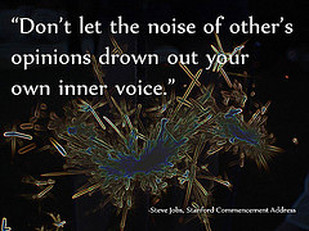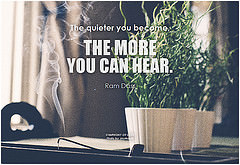
Young Susie Salmon is lured into an underground cavern by the murderer even though she clearly had doubts. The actress, Saoirse Ronan, gave an outstanding performance. She did not even have to speak and you knew exactly what she was thinking from her facial expressions and body language.
All too often we don't listen to our inner voice because we are afraid it may not be right. But, wouldn't you rather suffer some slight embarrassment in being overcautious, than suffer a tragic event?
Dr. Alex Lickerman wrote an article for "Psychology Today," titled Listening To Your Inner Voice, How Gut Instinct Is Just Your Intellect On Speed. He compiled a list of reasons why we don't listen to our instincts.
- An instinct is just that: a hunch, an impression, by definition lacking in concrete evidence. It seems unfair to rely on something so indistinct when making important decisions.
- We inherently mistrust ideas without evidence to support them. We want to be right when making important decisions and we're best able to convince ourselves of our rightness when we can trace our argument from beginning to end without interruption and with a clear understanding of every step.
- We're easily swayed by the opinions of others that contradict our instincts, especially if concrete evidence exists to contradict it. This, even knowing as most of us do that facts and figures about past performance are often flawed indicators of future performance.
Dr. Lickerman goes on to tell us to trust our intuition, "What is intuition except the rapid assimilation of our impressions of a person or situation that yields a reaction or judgment so quickly we're not sure how it arrived? An intuition is not, in most cases, based on nothing as we often allow ourselves to believe-which we do because we so often fail to perceive the complex machinery functioning beneath the surface that brought us to it.
But that machinery does function—in fact, it's only because it functions so quickly and so well that we doubt it functions at all. But if we stop to reflect, to trace back over what was said, what we thought about it, and how we felt about what we thought (a surprisingly difficult thing to do well), we find it is often possible to unearth the pathway by which we arrived at our intuitive reaction, to identify the concrete reasons why we hesitated to make a decision that on the surface seemed a good one."
http://www.psychologytoday.com/blog/happiness-in-world/201005/listening-your-inner-voice
How can we teach ourselves to listen to our inner voice? It is the same three step method I have written about before. Stop, Look/Listen, and Go.

Whether listening to your inner voice saves you from making a bad lunch choice or saves you from a violent death, learn to listen. It is not always easy and it takes practice, but the more you practice listening to yourself, the easier it becomes and the more you hear.
 RSS Feed
RSS Feed